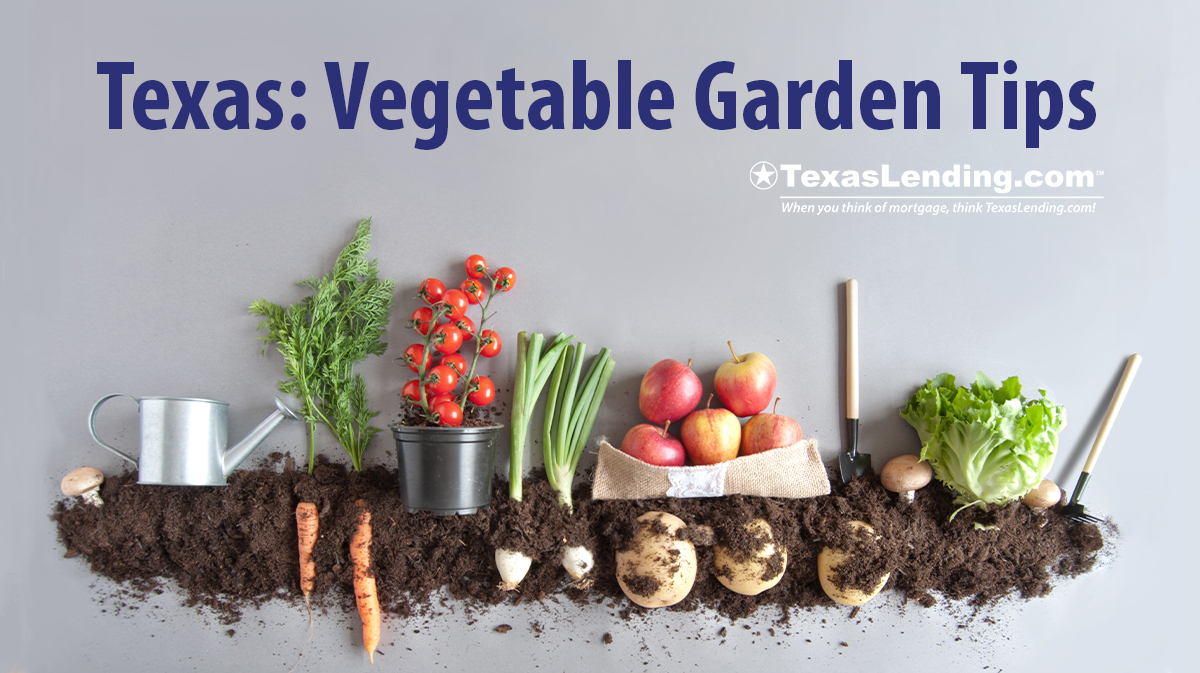Texas: Vegetable Garden Basics

If you have never planted a vegetable garden before or you don’t think you have a green thumb, this article will have some information for you. These gardening basics will help you get ready to start growing vegetables in your own back yard.
Sun, Soil, and Water
When you are planning where to start you own vegetable garden, you should first consider the three main factors that determine the potential success of your plants. Sun, soil, and water are the most important elements for a thriving vegetable garden.
Container gardens or raised garden beds are growing in popularity for backyard vegetable gardens, because they allow better control of the soil and water needed for your plants. Consider these factors to help your vegetable garden flourish.
Sun
Some plants thrive in the sun, while others prefer shade. Take a close look at the recommendations on where to plant different types of garden vegetables and herbs.
Remember that some plants grow better in hot weather and some prefer cooler weather in the Spring and Fall. Research what season is the best time to plant the different vegetables you would like to grow.
Soil
When you are thinking of planting, don’t forget that the quality of soil plays a large role in the success of your vegetable garden. Garden soil should provide nutrients to the roots of your plants, with the right amount of drainage.
There are certain plants that will grow best in sandy soil that has better drainage, like melons and gourds. Loam is description for soil that has an equal balance of sand, silt, clay, and organic matter. Loam soil is considered the best soil for plant growth and the widest variety of plants in your vegetable garden.
Water
Plants need water, but too much water can cause plant roots to rot. Make sure that potted plants have good drainage. Don’t flood your vegetable garden, but don’t let your soil get too dry… it’s about a good balance of water.
Choosing Plants
Things you love to eat!
Choose vegetables and herbs, that you will enjoy eating or sharing with your family and friends. Consider which plants will thrive in your climate region, before you plant your vegetable garden.
Popular plants for Texas backyard gardens include:
- Tomatoes
- Varieties of peppers
- Okra
- Green beans
- Peas
- Cucumbers
- Squash – yellow and green varieties
- Eggplant
- Pumpkins
- Carrots
- Radish
- Beets
- Cilantro, dill, and other herbs
- Strawberries
Plants that prefer shade (in Texas)
- Broccoli
- Sweet potatoes
- Irish potatoes and other varieties of potatoes
- Spinach, kale, and other greens (Preferring cool to warm weather)
- Basil
- Green onions, chives, and scallions
- Cabbage
- Rhubarb and celery
Plants that repel pests and grow well in Texas:
- Lemon Balm (prefers shade)
- Mint
- Marigolds
- Lemongrass
- Rosemary
- Basil
- Thyme
- Garlic
- Onions
Weeds and Pests
Fertile soil attracts weeds, and healthy plants will attract some pests. It is important that you remove the weeds that can choke out your vegetable plants. Deter the bugs and other animals that will munch on your growing fruits and vegetables.
Instead of using chemicals that could kill the good pollinators in your garden or be harmful to your health, consider natural alternatives. The plants listed above can keep some pesky bugs away. You could also use crushed eggshells, citrus peels, or tea tree oil to repel garden pests.
Growing a vegetable garden in your backyard is a great way to add numerous benefits to your life. We hope that these tips inspire you to start growing your own garden.
Read more about gardening in our blog:
We love to share tips for homeowners to be happy and healthy at home. To see more blogs like this one, follow our Facebook page.
As always, we are here to help you with all of your mortgage questions and needs. Reach out to us on TexasLending.com when you are ready to buy a home or refinance your current mortgage.

